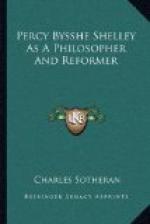I have shown you Shelley in his writings, his life and poetry, only where they trench on his philosophical and reform ideas—I could have related to you much about his inflexibly moral, generous, and unselfishly benevolent character—his pure, gentle and loveable existence—his utter abnegation of self, learnt from the hermetic philosophy, and his despisal of transitory legislative honors—how he, the heir to thousands of dollars annually, and a baronetage, threw aside pecuniary considerations for love of the truth and benevolence,[G] and how, therefrom, he was often nearly dying of hunger in the streets. I could have treated him simply as a poet, full of experienced impetuosity, subtlety of expression, and precision of verse, but I have aimed to exhibit one side of his immortality to you, which lives in and by the race, for humanity.
[Footnote G: “In his heart there was nothing depraved or unsound; those who had opportunities of knowing him best, tell us that his life was spent in the contemplation of nature, in arduous study, or in acts of kindness and affection. A man of learning, who shared the poverty so often attached to it, enjoyed from him at one period a pension of a hundred pounds sterling a year, and continued to enjoy it till fortune rendered it superfluous. To another man of letters, in similar circumstances, he presented fourteen hundred pounds; and many other acts like these are on record to his immortal honor. Himself a frugal and abstemious ascetic, by saving and economising, he was able to assist the industrious poor—and they had frequent cause to bless his name.”—National Magazine.]
Cut short in the youth of manhood, who can tell what Percy Bysshe Shelley might, not have become, living for us even perhaps at this moment? What need we care, though, for does not the “Empire of the dead increase of the living from age to age?” Shelley’s terrestrial body may have been cast up by the waves on the lonely Italian shore, in sweet companionship with the souls of Keats and Sophocles. His mundane elements, purified through the fire, may have returned to their kindred elements, and been
“made
one with Nature, where is heard
His voice in all
her music, from the moan
Of thunder to the song of
night’s sweet bird;
He is a presence
to be felt and known,
In darkness and in light,
from herb and stone,
Spreading itself
where’er that Power move,
Which has withdrawn his being
to its own;
Which wields the
world with never-wearied love,
Sustains it from
beneath, and kindles it above.”
His cinereal ashes may lie beneath the cypresses, near the dust of the “Adonais” of his muse, under Roman sod, and where he said:




